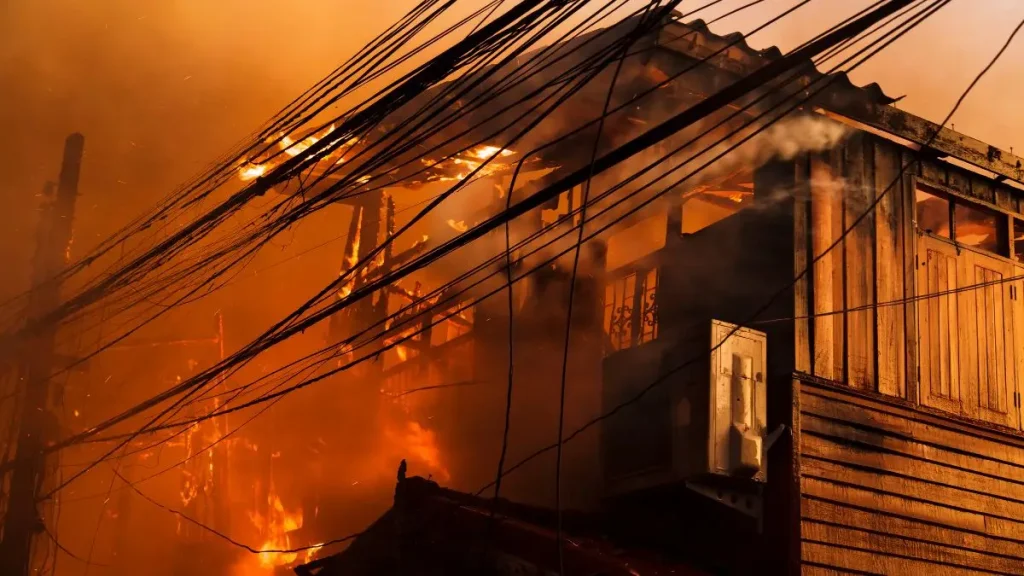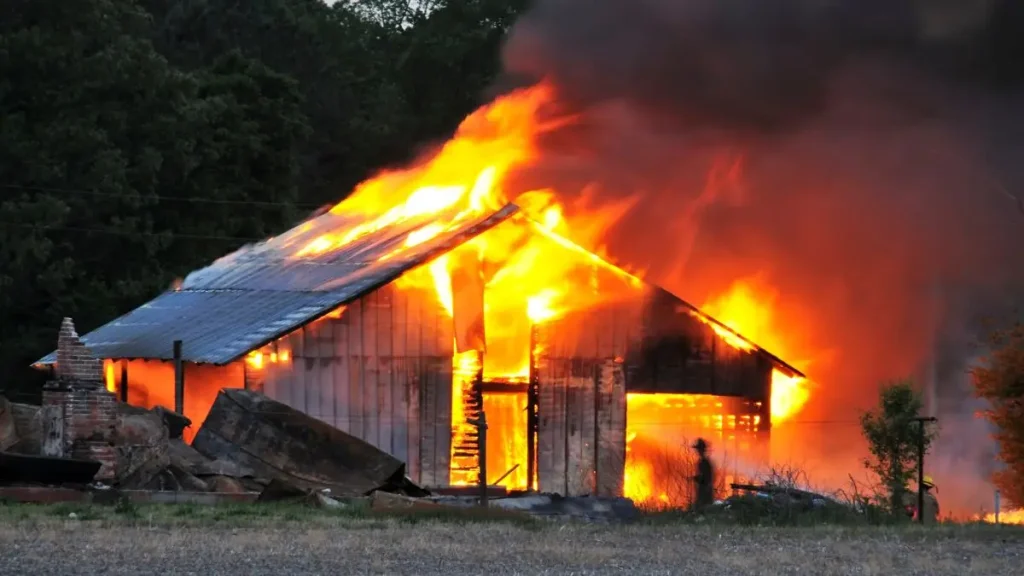Philly Fire and Explosion Kill 1 and Injure 2, Destroying Several Homes
Just before 5 a.m. Sunday morning, everything changed on a quiet block in Nicetown. I’m talking about the kind of early morning where most people are still asleep, maybe starting coffee. But in the 1900 block of West Bristol Street, that peace was ripped apart by a violent explosion.
Three row homes were completely leveled. Five others—damaged, shaken, barely standing. Firefighters said the blast was so strong, it scattered debris across rooftops and set off alarms blocks away. You can imagine what that does to a neighborhood.
One person lost their life. Two women—ages 82 and 62—were pulled from the rubble, barely alive. Both are in the hospital. This wasn’t just a fire. It was destruction. Sudden, terrifying, and still without a clear cause.
I’ve looked through every major report—ABC, CBS, local Philly stations, AP News—and most repeat the same basic facts. What’s missing? Real human context. Nobody’s asking: how does this kind of thing just happen in a major city? What systems failed? Why were those homes so vulnerable?
We’ll dig into that. But for now, what matters is this: a blast woke people up in the worst possible way. Lives were lost. Families displaced. And the community is still trying to understand what hit them.
Your take: If this happened on your block, how ready would you be? What would you want answers on first?
Let’s get into that, together.
On-the-Ground Eyewitness Reports
If you’ve ever been near an explosion, you know the sound sticks with you. For neighbors in Nicetown, it wasn’t just a sound—it was a gut punch.
People described it as “a giant boom” that made their walls shake. Some thought it was an earthquake. Others ran barefoot into the street, still in pajamas, panicked and confused.
One neighbor told reporters they saw flames shooting up before they even realized what had happened. You can picture the chaos: smoke, screams, sirens, people yelling names, trying to figure out who made it out.
Two women—82 and 62 years old—were trapped inside. Firefighters managed to pull them out alive. One of them is a city worker. She’s in stable condition. The older woman is still critical.
This isn’t just a news story. These are people like you and me, waking up in a home they’ve lived in for decades—only to have it ripped apart in seconds.
Search and Recovery Efforts

What really stood out to me in the coverage from ABC News was how intense and dangerous the recovery operation was.
More than 60 firefighters showed up within minutes. They weren’t just fighting flames—they were crawling through debris looking for survivors. One of the most heartbreaking details: it was a K-9 search dog that located the body of the person who didn’t make it.
Crews had to dig carefully, knowing every piece of the collapsed structure could shift. This wasn’t a quick, one-and-done kind of job. They stayed for hours, clearing, checking, hoping.
And while we all want to move on quickly from a tragedy, these teams can’t. They have to sift through rubble, secure gas lines, and make sure no one else is at risk. It’s exhausting. It’s dangerous. And it’s deeply personal when someone doesn’t make it out.
These kinds of sudden disasters can strike at any moment—even when you’re not home, like in this Winthrop case where a house was lost while the owner was out watching a baseball game.
Evacuations, Shelter & Community Care
Imagine being told to leave your home in the middle of the night with nothing but your phone and the clothes on your back. That’s exactly what happened to more than ten families living nearby.
The Fire Department evacuated several surrounding homes immediately after the blast. Structural damage made the entire block unsafe. You didn’t even need to see flames to know you were in danger—the air itself was thick with dust and fear.
Those families were taken to Edward Steele School nearby, where the Red Cross and Salvation Army were already setting up temporary shelter. They brought blankets, food, and someone to talk to—because this wasn’t just about losing property. It was about sudden trauma, especially for families with young kids or elderly relatives.
And if you’re wondering how you’d cope if this happened to your home? That’s worth sitting with. Because these folks didn’t expect it either.
Local alerts like these often break first in community WhatsApp updates before they hit the news. I’ve seen it myself—sometimes those groups are faster than official channels. If you’re part of one that shares reliable local updates, keep an eye out. They make a real difference during moments like this.
Structural Impact & Hazards Around the Scene
I want you to think about how tightly packed row homes are in Philly. One explosion doesn’t just hit one address—it shakes the entire block.
In this case, three homes were destroyed. Completely gone. Five others suffered serious damage. Walls cracked. Windows shattered. Some houses shifted off their foundations. Fire officials said they were worried even more buildings could collapse.
Crews spent the entire day making the area safe. They brought in structural engineers to assess whether nearby homes were even habitable anymore.
And here’s the thing: the explosion was so forceful that debris landed on rooftops across the street. That tells you this wasn’t a small leak or a minor fire. It was a full-on structural event—one that put dozens of lives at risk in just seconds.
This isn’t just tragic. It’s also a red flag. Because if one leak or fault line can do this… how many other homes in the city are vulnerable too?
Sadly, stories like this aren’t rare. Just weeks ago, an elderly woman lost her life in a similar Bronx home fire that also left several people injured.
Preliminary Investigation: Cause & Involved Agencies
Let’s talk about the one thing we’re all wondering: how the hell did this happen?
Right now, there’s no confirmed cause. But that hasn’t stopped the investigation. The Bureau of Alcohol, Tobacco, Firearms and Explosives (ATF) is involved. So is Philadelphia Gas Works (PGW). The Fire Marshal’s team is on-site, too. Everyone’s looking into whether it was a gas leak, a faulty line, or something else entirely.
According to ABC7 Chicago, officials haven’t ruled anything out yet. They’re testing gas lines, digging through wreckage, and reviewing 911 calls. And from the looks of it, we might be weeks away from solid answers.
But here’s what I want you to take from this: in a city with aging infrastructure and complex utility systems, it doesn’t take much to trigger disaster. A silent leak. A missed inspection. One spark.
You and I both know this won’t be the last time something like this happens. So the real question is—what are cities doing to prevent the next one?
What do you think caused this? Faulty infrastructure, ignored complaints, or something else? Drop your thoughts below—I’d really like to hear how you see it.
Contextualizing: Philly Home Fires & Explosions Trend

Here’s what most news outlets won’t tell you: this isn’t the first time something like this has happened in Philly. And probably won’t be the last.
Remember the 2023 Port Richmond gas explosion? That took out an entire row of homes on New Year’s Day. A few months later, a South Philly house collapsed after a contractor struck a gas line. Over the years, these events have started forming a pattern—and if you live in an older neighborhood, that should make you pause.
Most of the big outlets just report the “what.” But I want to talk about the why. Why are these homes so vulnerable? Is it aging infrastructure? Delayed repairs? Weak inspection systems?
No one in the current coverage is really digging into that. And it’s a missed opportunity. Because the more we connect the dots, the more we can demand better from city systems and utility companies.
If you’re living in a row house built before the 1950s—ask yourself: when was the last time your gas line was inspected?
Fire crews around the country continue to go above and beyond—even saving pets in disasters, like in this Ohio fire rescue case, where firefighters saved multiple animals from a burning building.
Safety Takeaways for Homeowners in Philly
If you’re reading this from Philly—or any older city—you need to think about your own home’s safety.
Gas leaks don’t always come with a strong smell. Faulty appliances, old pipes, or renovations can trigger problems silently. Here’s what I want you to do tonight:
- Install a gas detector. It’s as crucial as a smoke alarm.
- Know the signs. Rotten egg smell, hissing sounds, dead grass around outdoor lines? Call your gas company.
- Don’t DIY gas work. Always get licensed professionals, even for “quick fixes.”
- Ask your landlord or city about recent inspections. You have a right to know.
It’s easy to think this only happens to “someone else.” But trust me—it happens fast. One faulty line. One missed check. And it’s too late.
What Happens Next: Rebuild & Recovery Roadmap
So where does the neighborhood go from here?
First, investigators have to finish their job. That includes testing gas lines, reviewing structural integrity, and interviewing residents. That could take weeks.
Then come the city inspectors. Any nearby homes that shifted or cracked during the blast will need full assessments before families can return.
If homes are declared unsafe, insurance claims start rolling. For some, that’s months of back-and-forth with adjusters. For renters? It might mean starting over.
The city has promised to help. But you and I both know how slow that process can be. In the meantime, it’s on neighbors, churches, and local groups to fill in the gaps—with food, blankets, even just a place to sleep.
Here’s where you come in: if you’re in Philly and can donate, do it. If you’re outside, share the story. Awareness leads to accountability.
And if you live in a home that hasn’t been inspected in years… maybe it’s time to ask some questions.
Final Thoughts
It’s easy to scroll past a headline like “Philly Home Fire” and not feel much. But behind that headline are people—families who lost everything in seconds, neighbors who watched their block explode, and an entire city that needs to start asking harder questions.
You and I can’t control what happened. But we can control how seriously we take safety, how we support our communities, and how we demand better from the systems that are supposed to protect us.
If this shook you—even a little—don’t let that feeling fade. Do something with it.
Want to see how other communities have faced similar fire disasters—and what they did next? Visit our website to explore more stories that matter.
Disclaimer: This article is based on publicly available news sources and official statements as of July 1, 2025. Details may evolve as investigations continue. Always refer to local authorities or verified outlets for the most up-to-date information.


